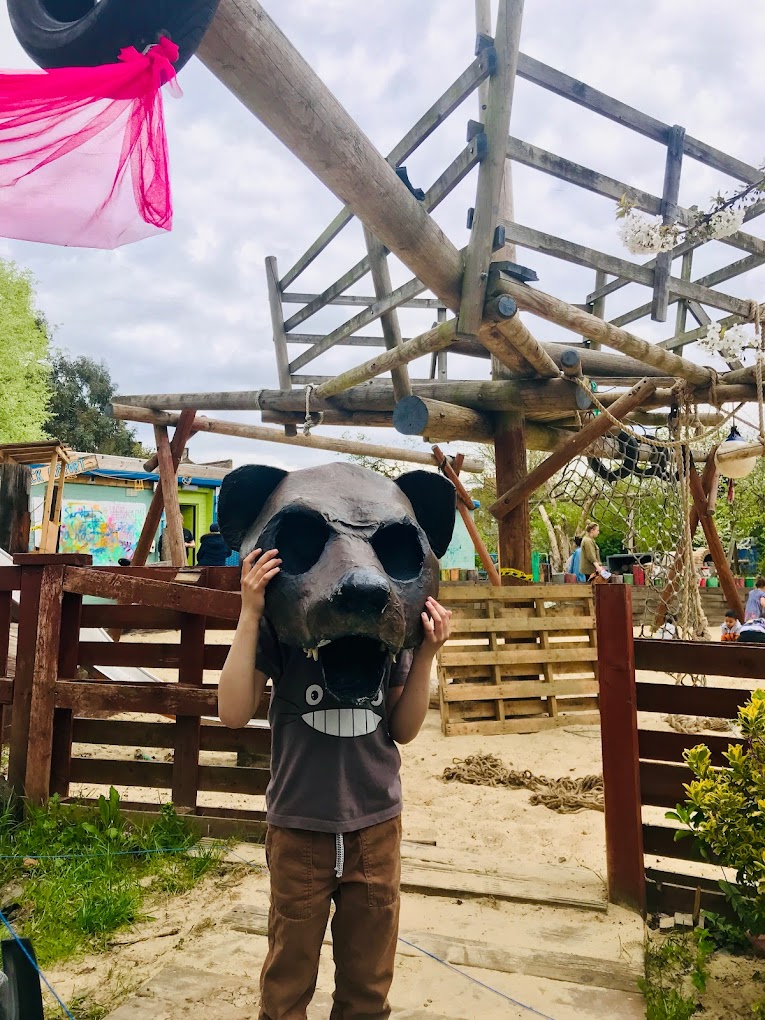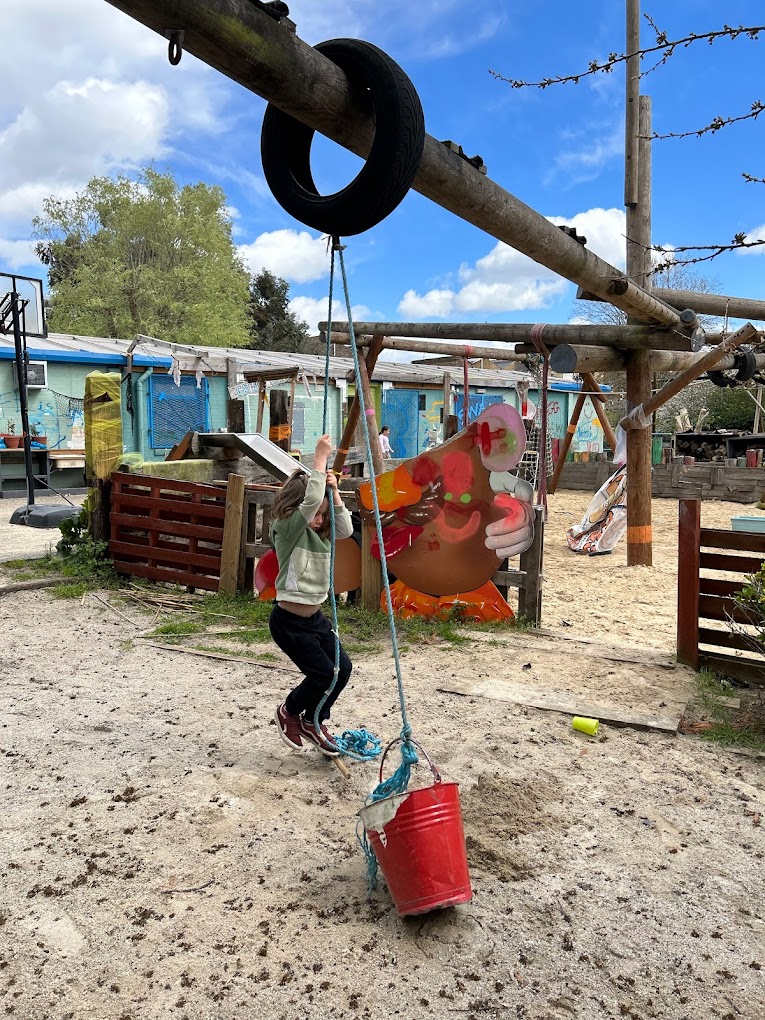Get updates from The Developer straight to your inbox Yes, please!
Could the adventure playground hold the solution to the construction skills shortage?
Adventure playgrounds are not a new concept, but their longstanding tradition of giving children the tools, skills and materials to build their own play structures holds fresh resonance in an industry facing a skills, diversity and inclusivity gap, Christine Murray reports

“These places have been doing co-design from the beginning," shares Nitasha Kapoor, anthropologist and trustee of SWAPA (Shakespeare’s Walk Adventure Playground Association) in Hackney.
We’re taking about the adventure playground. It’s not a new concept – the first adventure playground in the UK opened in Camberwell in 1948. But its longstanding tradition of giving children the tools, skills and materials to build their own play structures under supervision of trained playworkers has fresh resonance in a construction industry facing an acute skills shortage.
While several major developments including Mayfield Manchester, New Poundbury, London’s Olympic Park and Brent Cross Town have created adventurous playgrounds, the adventure playground is a different beast entirely. Usually enclosed with specific opening times, adventure playgrounds are run by qualified playworkers who look after the children and support their play needs.
“The playground belongs to the children,” explains Kapoor. “The process is the purpose.” What that means is that children are free to make the space their own – mark making, painting and building or demolishing their own structures, all under the watchful eye of trained playworkers. The kids build with tools, light fires, make music, learn to skateboard, and climb or swing on existing or improvised structures constructed or made out of loose parts.
Perhaps the biggest point of difference between a typical playground and an adventure playground is the playworker: “There is a rich tradition and literature around adventure play,” explains Kapoor. “There are 16 different types of play, all of them necessary for effective childhood development, and the playworkers are trained in all these stages.”
“They’re not camp counsellors,” Kapoor adds. “They are watching and intervening at the right moments – they are not guiding. It’s very different to a youth club.”
This creates a vital role for the adventure playground in the community in urban areas where independent childplay is curtailed. Let’s make it plain: the adventure playground offers free afterschool childcare, as once a child is registered with the playground and is over the age of 6 and up to the age of 16, they are free to come on their own whenever SWAPA is open. It also offers the space and scope for things that kids aren’t allowed to do anywhere else. There are few places where kids can go independently for free where they are supervised, and fewer still that offer the freedom to embark on child-led – read: noisy and messy – activities.
Walking into SWAPA, there is traditional playground equipment including swings and slides, but also an unfussy-ness in the complex and its many kits of loose parts (tyres, wood, toys, art supplies) that invite children to make the place their own. It has a sandpit, but it is a sandbox. SWAPA has recently added a recording studio and a skateboard ramp to serve local teenagers better. It looks a lot rougher than the polished playgrounds at the heart of many regeneration projects, but it’s a garden for independence, invention and creativity in design and construction.
This is a different place than home, school or the park: “We allow for emotion,” says Kapoor. Explaining how children use play to process their challenges, she describes a kid who came to the playground feeling frustrated and wanting to smash things up. They gave the child a hammer. “They left feeling so much better. Our entry and exit surveys ask the children about their mood. There is a huge shift towards feeling calmer and happier.”
What about safety? The playground is insured, staff are trained and SWAPA’s senior playworker is a Health and Safety Inspector. “She is on it, which is very reassuring for us as trustees and parents and carers. We always have an eye on that.”
There are few places where kids can go independently for free where they are supervised, and fewer still that offer the freedom to embark on child-led – read: noisy and messy – activities
The biggest challenge is funding. It’s been a year of highs and lows for SWAPA. They’re riding high, having won Arts Council funding and scooped the award for Adventure Playground of the Year from charity London Play. But this week, Kapoor is fundraising to replace a full suite of Dewalt power tools that were stolen from the site, on top of raising money for a zip-line and their massive capital project to replace their fence – an £100,000 project.
“Adventure playgrounds rely on donations and we couldn’t exist without them,” says Kapoor. To raise funds, they host corporate away-days and parties. Materials and offcuts are donated from local builders and developers – the playground prefers sustainable materials that are easier and safer for children to work with, such as untreated pallets and wood. But more and deeper partnerships are welcome.
SWAPA is hoping to forge partnerships with organisations in the built environment. To find out more, email trustees@swapa.org.uk
“Councils are stretched and are feeling it,” says Kapoor. Hackney does give some funding to SWAPA, but she is hoping to forge partnerships with organisations in the built environment. “It feels like this comes down to long-term partnerships with champions within organisations who see the value in it. A £15,000 donation would build an entire zip-line structure.”
Kapoor invites organisations interested in their work to reach out. “The reality of the situation is that in [other] countries adventure playgrounds are seen as community hubs and get invested in. I think there just needs to be an understanding about the role that adventure playgrounds can play in the social mix.”
“Long-term thinking is what’s needed. If you invest in children and young people, everything starts to make sense. You’re not having to react to problems that start to occur down the line.”
With the construction industry struggling to address its skill shortage, while developers build playgrounds to engage communities and attract families, a revival in interest, pride and investment in the adventure playground is overdue. It ticks so many boxes, from STEM to construction skills training. And Kapoor points out that SWAPA has been running for 47 years – it’s not a risky investment, but a tried, tested and proven one, with the potential to train and inspire future placemakers.
“It’s a no-brainer for me,” says Kapoor. “There’s a reason these have been going for so long. Our adventure playground is beloved in our community.”
To support the appeal for stolen tools, the zipline fundraiser or to donate towards the fence project, visit SWAPA. To find out more about partnerships, email trustees@swapa.org.uk
Sign up to The Developer Weekly email to find out when new episodes of The Developer Podcast go live. You can get episodes early and our magazine when you support our podcast on Patreon at www.patreon.com/thedeveloperuk
If you love what we do, support us
Ask your organisation to become a member, buy tickets to our events or support us on Patreon
Sign up to our newsletter
Get updates from The Developer straight to your inbox
Thanks to our organisation members
Become a member
© Festival of Place - Tweak Ltd., 124 City Road, London, EC1V 2NX. Tel: 020 3326 7238

